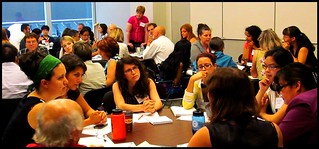 Many questions have arisen about the demonstration project Creating the Future has embarked upon with the Pennsylvania Association of Nonprofit Organizations (PANO). In preparation for our next meeting (Thursday February 27th from 1pm-3pm ET – watch it below), we thought we would catch folks up on what we have been doing, and what we’re learning so far.
Many questions have arisen about the demonstration project Creating the Future has embarked upon with the Pennsylvania Association of Nonprofit Organizations (PANO). In preparation for our next meeting (Thursday February 27th from 1pm-3pm ET – watch it below), we thought we would catch folks up on what we have been doing, and what we’re learning so far.
Creating the Future’s initial goal for this project was a “proof of concept.” Having seen our fellows create significant shifts on a small scale (organization by organization), we are anxious to explore the potential for intermediary groups (funders, capacity builders, associations, etc.) to impact whole regions by rooting their work in The Pollyanna Principles.
Demonstration projects therefore have the potential to:
- Identify what works: Explore and experiment to learn what works on the ground
- Identify why it works: Once we find what works, determine the questions and thinking at the heart of the doing.
- Model what works: Show that it is possible.
- Document what works: Gather and provide evidence of both the how and the why
- Scale what works: Successful replication, focused on replicating the thinking vs. the doing
As we have been working so closely with our partners at PANO and at the Community Foundation of Westmoreland County, we are realizing that there are other practices we are demonstrating simply by our partnering with a shared vision for success. So far, the following is a sampling of results this single demonstration project is already creating, simply by our embarking on this journey and doing the work together.
- Strengthen Communities: Demonstrate how an intermediary organization can amplify and accelerate existing movements for strengthening communities (our ultimate desired result!)
- Reinvent Capacity Building to Create Community Change: Demonstrate what it takes for a capacity building program (the joint PANO / Creating the Future conference) to model the future we want to see, in every aspect of that program (from how each educational session models our values, to how the “vendor booths” can be transformed into areas of deep engagement, to other ways for walking the talk of our desired results in every single thing we do.)
- Open participation: Demonstrate that all this can be done live online, where the whole world has the potential to not only watch, but participate (as you can do at our next meeting below!)
- Partnering Rooted in Trust and Relationship-building (vs. Transaction / Expediency): Demonstrate what it takes to build true partnership (and to do so live online), where each party learns, each party applies what he/she learns to their own lives outside the project, and each party puts what resources they have into the pot.
- Budgeting together from a position of Collective Enoughness: Demonstrate what budgeting looks like when it is explicit about ALL resources that are needed (not just cash), and when the parties assume that together they will find / have everything they need.
Work So Far
Having spent several months of 2013 focusing on what we jointly want this conference to accomplish, we have spent 2014 working on
• Work calendar
• Determining the content and the format for the conference
• Budgeting the conference (towards the development of a memo of understanding between the parties) using these worksheets based on the core principles of Collective Enoughness
• Content development
You can watch any / all those meetings at the links here.
Thursday’s Meeting
The conference is on April 28th and April 29th. The crunch is on to prepare initial promotions materials. And THAT means it’s crunch time for establishing the content people can expect to see in those promotional materials!
At our meeting on Thursday, we will therefore sketch out that content.
We have already determined that there will be four main subject areas addressed in educational workshops:
• Leadership & Governance
• Resource Development
• Planning & Strategy
• Relationship Building / Colllaboration / Engagement
Further, we’ve determined that each subject will be presented through 5 different lenses:
• Tool and Technique-based workshops (exploring and practicing with new tools)
• Skills Development workshops (exploring and practicing new skills)
• Transformational workshops (going deep into cutting edge approaches)
• Cross-sectoral workshops (addressing the topic across all sectors e.g. leadership, strategy, etc.)
• Peer coaching workshops (led by specialists and facilitators, a place to address specific issues facing your organization, related to the topics. E.G. "What to do when X happens?”)
We will now dig in to see exactly what that means – what the breakout workshops will comprise. From that discussion, the marketing will flow, as will the selection and preparation of presenters.
We hope you will join us for this discussion. Watch right here – and tweet your questions, input, ideas to the hashtag #CTFuture.
We look forward to your participation in this ongoing experiment to demonstrate what is possible!

Building a board of ambassadors? rather than getting them to raise money.
instead of cutting edge; transformational experiences/practices/discussions/conversations to have with your board